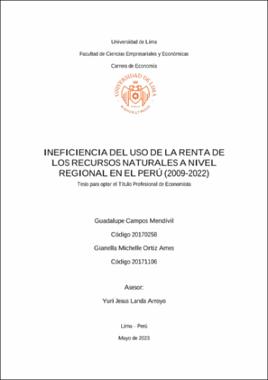Mostrar el registro sencillo del ítem
Ineficiencia del uso de la renta de los recursos naturales a nivel regional en el Perú (2009-2022)
| dc.contributor.advisor | Landa Arroyo, Yuri Jesús | |
| dc.contributor.author | Campos Mendívil, Guadalupe | |
| dc.contributor.author | Ortiz Ames, Gianella Michelle | |
| dc.date.accessioned | 2023-07-24T13:29:52Z | |
| dc.date.available | 2023-07-24T13:29:52Z | |
| dc.date.issued | 2023 | |
| dc.identifier.citation | Campos Mewndivil, G. & Ortiz Ames, G. M. (2023) Ineficiencia del uso de la renta de los recursos naturales a nivel regional en el Perú (2009-2022) [Tesis para optar el Título Profesional de Economista, Universidad de Lima]. Repositorio Institucional de la Universidad de Lima. https://hdl.handle.net/20.500.12724/18536 | es_PE |
| dc.identifier.uri | https://hdl.handle.net/20.500.12724/18536 | |
| dc.description.abstract | The growth of extractive economic activity has been reflected in the increase of its transfers to subnational governments, a process that allows governments to generate their own income to better spending; however, according to multiple authors, there is an inefficiency in its execution. This research seeks to estimate a quantitative and qualitative analysis of the behavior of capital spending for transfers of natural resources to regional governments to identify the main causes of its inefficiency, during the years 2009-2022. The main hypothesis is that regions tend to respond significantly more to government transfers than to transfers generated with their own resources (taxes, tributes, etc.), which leads to the suggestion that there is fiscal laziness within Peru's regions and a dependence on government transfers. For this, a Panel Data model was made to make the estimates at the quarterly level (2009-2022), added to different tests that help to choose between three possible proposed models: Pooled regression, random effects, and fixed effects. Among the results obtained, it was demonstrated that there is a better response to government transfer revenues than to the revenues generated by local and regional governments, highlighting the negative effect that these have on the efficiency of capital expenditure. | en_EN |
| dc.description.abstract | El crecimiento de la actividad económica extractiva se ha reflejado en el incremento de transferencias por recursos naturales hacia los gobiernos regionales, proceso que permite la posibilidad de que estos puedan generar ingresos propios con el fin de realizar una mejor distribución del gasto; sin embargo, según múltiples autores, se aprecia una ineficiencia en su ejecución. La presente investigación busca estimar un análisis cuantitativo y cualitativo del comportamiento del gasto de capital por transferencias de recursos naturales a los gobiernos regionales, para identificar las principales causas de su ineficiencia, durante los años 2009-2022. La principal hipótesis es que las regiones suelen responder mucho más significativamente ante transferencias gubernamentales que ante transferencias generadas con sus propios recursos (impuestos, tributos, etc.), lo que conlleva a plantear una existencia de pereza fiscal dentro de las regiones del Perú y una dependencia de las transferencias gubernamentales. Para ello, se realizó un modelo de Panel Data para realizar las estimaciones a nivel trimestral (2009-2022), sumado a diferentes pruebas que ayuden a elegir entre tres posibles modelos planteados: Regresión agrupada (pooled), efectos aleatorios y efectos fijos. Dentro de los resultados obtenidos, se demostró la mejor respuesta que existe ante los ingresos por transferencias gubernamentales que ante los propios ingresos generados por los gobiernos regionales, poniendo en evidencia el efecto negativo que tienen estas sobre la eficiencia del gasto de capital. | es_PE |
| dc.format | application/pdf | es_PE |
| dc.language.iso | spa | es_PE |
| dc.publisher | Universidad de Lima | es_PE |
| dc.rights | info:eu-repo/semantics/openAccess | * |
| dc.rights.uri | https://creativecommons.org/licenses/by-nc-sa/4.0/ | * |
| dc.source | Repositorio Institucional - Ulima | es_PE |
| dc.source | Universidad de Lima | es_PE |
| dc.title | Ineficiencia del uso de la renta de los recursos naturales a nivel regional en el Perú (2009-2022) | es_PE |
| dc.type | info:eu-repo/semantics/bachelorThesis | |
| thesis.degree.discipline | Economía | es_PE |
| thesis.degree.grantor | Universidad de Lima. Facultad de Ciencias Empresariales y Económicas | es_PE |
| thesis.degree.level | Título Profesional | es_PE |
| thesis.degree.name | Economista | es_PE |
| dc.publisher.country | PE | es_PE |
| dc.subject.ocde | https://purl.org/pe-repo/ocde/ford#5.02.01 | |
| renati.author.dni | 71656274 | |
| renati.author.dni | 76204997 | |
| renati.advisor.orcid | https://orcid.org/0000-0003-0221-227X | |
| renati.advisor.dni | 7824407 | |
| renati.juror | Moreno Moreno, Nora Isabel | |
| renati.juror | Burns O'Hara, Alan Robert | |
| renati.juror | Landa Arroyo, Yuri Jesús | |
| renati.level | http://purl.org/pe-repo/renati/level#tituloProfesional | |
| renati.type | https://purl.org/pe-repo/renati/type#tesis | |
| renati.discipline | 311016 | |
| ulima.lineadeinvestigacion | 5300 – 6.c2 | |
| ulima.cat | OI |
Ficheros en el ítem
Este ítem aparece en la(s) siguiente(s) colección(ones)
-
Tesis [82]





